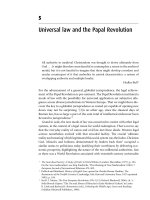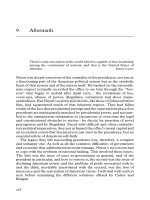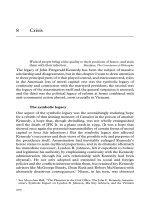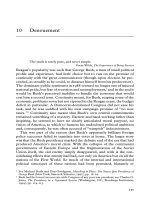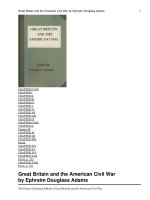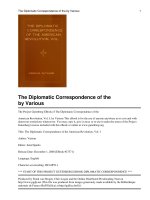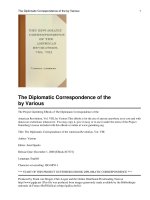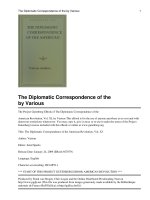- Trang chủ >>
- Mầm non - Tiểu học >>
- Lớp 5
5 2 5 paul revere and the american revolution TG
Bạn đang xem bản rút gọn của tài liệu. Xem và tải ngay bản đầy đủ của tài liệu tại đây (124.83 KB, 4 trang )
Paul Revere and the
American Revolution
SUMMARY
The author describes the activities
of Paul Revere before the early battles
of the American Revolution. In addition,
the author sets the stage for the conflict
behind the American Revolution by reviewing
the disagreements between the American
colonists and the British.
LESSON VOCABULARY
fate
glimmer
magnified
steed
fearless
lingers
somber
INTRODUCE THE BOOK
INTRODUCE THE TITLE AND AUTHOR
Discuss
with students the title and the author of
Paul Revere and the American Revolution.
Ask students to think about the title and
what the book will be about. Discuss why
the author may have chosen to focus on the
activities of Paul Revere. Ask: What do you
know about Paul Revere, and what would
you like to know about him?
BUILD BACKGROUND
Discuss with students
what they know about dealing with a situation
in which someone’s rights are not respected.
Ask: What are some of the basic American
freedoms? What action would you take to
protect your freedoms if someone tried to
take them away?
PREVIEW/USE ILLUSTRATIONS
Encourage
students to look at the illustrations in the
book. Ask them to choose one and explain
what it seems to tell about the book. Suggest
that they check after their reading to see if
their prediction was correct. Ask students to
study the image in the stamp place on page
7. Discuss what it might mean to the story of
the American Revolution.
48
5.2.5
SEQUENCE
GRAPHIC ORGANIZERS
READ THE BOOK
SET PURPOSE
Encourage students to set a
purpose for their reading that includes realizing how sequence and cause and effect can
help their understanding of historical material.
Suggest that they list events and analyze them
for sequence. Students can also list events
that were causes, events that were effects,
and events that served both purposes.
STRATEGY SUPPORT: GRAPHIC ORGANIZERS
Remind students that graphic organizers are
useful tools for putting information in order so
that we understand and remember it better.
Ask students what kinds of graphic organizers
might be most effective with historical
narratives. (time lines or sequence charts)
COMPREHENSION QUESTIONS
PAGE 4
What was the purpose of a liberty
tree? (Colonists posted complaints and gathered there to discuss their problems with the
British.)
PAGES 5–6
What event came before the
American Revolution that caused the British
to go deeply into debt? (The French and Indian
War)
PAGE 7
Why did the colonists oppose taxation
so fiercely? (They had no voice in the British
government.)
PAGES 11–12 How did a misunderstanding
about the Boston Massacre contribute to
tensions between Americans and the British?
(Although it is possible that the massacre was
a mistake, Paul Revere publicized it as an
intentional act on the part of the British, and
the Americans grew angry.)
Paul Revere and the American Revolution
16917_LRD_TG_048-049 48
1/11/06 2:12:25 PM
REVISIT THE BOOK
READER RESPONSE
1. Possible response: B, A, C
2. Possible response: What was it like to
be a dentist during the Revolution? an
encyclopedia
3. Possible response: In the glimmer of the
candle, I saw a steed go by my window. He
had a somber tread, as though he knew his
master’s fate. But as the danger magnified,
his master became even more fearless, and
the two easily jumped over the high fence.
The memory of their brave leap still lingers
in my mind.
4. Possible response: White pants were hard
to keep clean.
Skill Work
TEACH/REVIEW VOCABULARY
Ask students to identify the nouns among
the vocabulary words. (fate, steed, and
glimmer) Discuss the other parts of speech
that are used (adjectives and verbs) and
identify them.
Remind students that a noun is the
name of a person, place, or thing. Point to
objects around the classroom and identify
them as nouns. Ask students to name additional nouns. Remind them of the nouns on
the vocabulary list.
Encourage students to
look at the title page and the illustrations on
pages 10 and 17. Discuss some of the differences between the American and British soldiers. Ask: How might these differences have
affected the fighting ability of the two groups
of soldiers?
Explain the meaning of a verb. Act out
writing on the board, and explain that the
word writing is a verb. Remind students of
the verb on the vocabulary list. Explain the
meaning of an adjective. Point to someone’s
colored shirt and explain that the color is an
adjective. Remind students of the adjectives
on the vocabulary list.
RESPONSE OPTIONS
TARGET SKILL AND STRATEGY
EXTEND UNDERSTANDING
SEQUENCE
WRITING
Ask students to write a few paragraphs explaining why they would nominate
Paul Revere as a great American hero.
Encourage them to include details from the
book to support their nomination.
Remind students that when
we read, we put information in sequence
to help us understand it. Discuss some of
the events in this book that could be put in
sequence.
SOCIAL STUDIES
CONNECTION
GRAPHIC ORGANIZERS To put historical
events in order, students might use a
numbered list or a graphic organizer such
as a time line or sequence chart.
Encourage students
to find out information
about the Boston Tea Party that
describes the drama of the event. Suggest
that they check the Internet or the library to
see whether any short stories, poems, or
plays have been written about it.
ADDITIONAL SKILL INSTRUCTION
CAUSE AND EFFECT
Remind students that an
effect is an event that happens, and a cause
is why an event happens. Explain that there
can be many causes that lead to one effect,
as in the American Revolution. Discuss
some of the possible causes. Encourage
students to think about the American
Revolution. Even though it was an effect, it
also was a cause, because it led to a state
of independence for the colonists—another
effect.
Paul Revere and the American Revolution
16917_LRD_TG_048-049 49
49
1/11/06 2:12:27 PM
Name
Paul Revere
Sequence
• Sequence refers to the order of events in both fiction and nonfiction.
• Sequence can also refer to the steps in a process.
Directions Reread the following paragraphs from Paul Revere and the American Revolution.
Then put the bulleted events in sequence.
One law, passed in 1764, was called the Sugar Act. It taxed sugar, molasses, and other
products shipped to the colonies. Colonists who ignored the act were punished as smugglers.
A year later, the Stamp Act was passed by the British. This law required all legal and
business documents in the colonies to carry a stamp showing that a tax had been paid . . . The
colonists were very angry. They wondered what tax the British would decide on next . . . They
claimed the British were taxing them without representation.
Put the following events in sequence.
• The Stamp Act was passed by the British government.
• The colonists disliked being taxed without having a voice in the government.
• The Sugar Act was passed by the British government.
• Colonists who did not pay taxes on molasses were punished.
• Colonists had to stamp all business documents.
1.
2.
4.
5.
© Pearson Education 5
3.
50
16917_LRD_TG_050-051 1
12/28/05 1:18:05 PM
Paul Revere
Name
Vocabulary
Directions Draw a line from each word to its synonym.
Check the Words You Know
fate
magnified
fearless
somber
1. fate
increased
2. fearless
unafraid
3. glimmer
uncontrolled event
4. lingers
horse
5. magnified
faint light
6. somber
stays
7. steed
solemn
glimmer
steed
lingers
© Pearson Education 5
Directions Write a paragraph about the beginning of the American Revolution. Use as many
vocabulary words as you can.
51
16917_LRD_TG_050-051 2
12/28/05 1:18:07 PM

